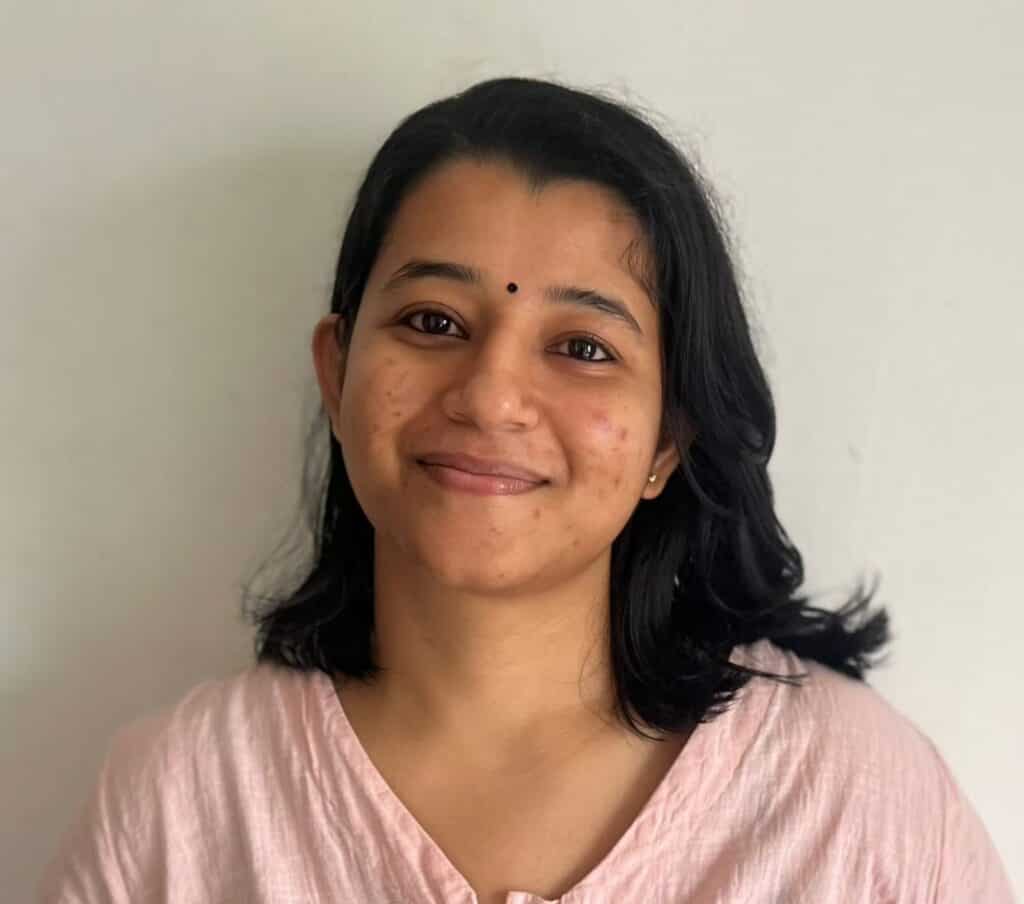From Human Rights to the Stage: How Nandini Jha Found her Voice in Theatre
YIF Alumna’s directorial work brings socio-emotional depth to the modern stage, Nandini Jha’s Parallels captures the texture of modern relationships with clarity.
A storyteller at heart and a thinker by training, Nandini Jha (YIF’22) has always believed in the transformative power of narratives. Her journey from Jamia Millia Islamia as a Gold Medalist in International Humanitarian Law and Human Rights, to the Young India Fellowship (YIF) at Ashoka University reflects her profound commitment to understanding and expressing the human condition.
Nandini has an academic foundation in journalism, human rights, and liberal arts. Her work thrives at the intersection of art and social consciousness. Today, she brings these sensibilities together as the Creative Director of Team 9:30, an amateur theatre collective founded in 2022 that stages stories of political and social relevance. Since joining the collective in 2023, Nandini has led and shaped a series of critically appreciated productions, including Pagla Ghoda, Ilhaam, Parallels, The Pillowman, and the upcoming Teesvi Shatabdi. Nandini’s plays reflect her commitment to provoke thought, invite dialogue, and evoke empathy through her storytelling.

Her most recent work, ‘Parallels’, is a contemporary love story that captures the emotional intricacies of modern relationships. It is a story of a couple navigating the fragile threads of love through moments of miscommunication, ego, and the desperate need for space. Through the characters of Hemant and Sangeeta, the play explores how a simple communication gap can lead to emotional distance and heartbreak. For Nandini, Parallels was an attempt to rekindle the lost magic of patience and open dialogue, a gentle reminder that companionship is not about perfection, but about understanding.
We spoke to Nandini about her creative journey, time at the YIF, and the ideas that inform her work. Here’s what she shared:
Tell us about your YIF experience
The Young India Fellowship (YIF) was a natural extension of my interdisciplinary journey from journalism to humanitarian law to liberal arts. It offered one of the most diverse curricula and cohorts I’ve ever been part of. I studied everything from Philosophy and Filmmaking to Critical Writing, and also worked with a Labour Rights NGO as part of the experiential learning module.
The academic breadth and practical exposure at YIF were instrumental in helping me secure admission offers to programmes like the Erasmus Mundus Master’s in Global Journalism and the Research Master’s in International Politics at SOAS, University of London. What shaped me equally was learning alongside peers from varied disciplines and being mentored by distinguished global faculty, all supported by world-class infrastructure. And I remain grateful to Deutsche Bank for the full scholarship that made this transformative year possible.
Could you tell us about your past productions and the themes you explored?
Theatre has always been a mirror to society, a space that reveals not just who we are but also who we can become. Over the years, I’ve had the privilege of engaging with this reflective and transformative power of storytelling, and two of my recent productions stand out for the questions they allowed me to explore – ‘Ilhaam’ by Manav Kaul and ‘Pagla Ghoda’ by Badal Sircar, one of the most influential voices in Indian theatre.
Ilhaam follows a man who experiences enlightenment yet chooses to continue living an ordinary life for his family. Its central idea highlights that enlightenment is not an escape from life but an embrace of it. This message resonated with audiences. For me, it was a reminder that meaning often lies in the quiet rhythms of the everyday. Whether one works in the arts, in a corporate office, or anywhere else, fulfilment comes from turning daily responsibilities into acts of purpose and care. One of the most memorable audience responses came from a group of bank employees who commute four hours a day on Mumbai locals. After watching Ilhaam, they shared how the play reframed their commute, shifting it from a burden to a daily act of love and responsibility. Moments like these reaffirm why we do theatre – reflection, shift in perspective, and help people rediscover meaning in the ordinary.
Pagla Ghoda, which I directed next, interrogates patriarchy through four interconnected stories of men shaped by societal conditioning. Each narrative reveals a different facet of emotional suppression and moral conflict, from forbidden love and caste prejudice to familial pressure and the anxieties of aging. Traditionally, the play features a female ghost whose presence forces the men to confront their past. As Creative Director, I reimagined the ghost as a male spirit, reflecting the belief that dismantling patriarchal thought must also emerge from within men themselves. This shift added a layer of accountability and invited deeper reflection. The response was overwhelming, and Pagla Ghoda became our first houseful show in Pune and was later featured by the Times of India (Pune), a milestone for our collective.
Both Ilhaam and Pagla Ghoda were not just productions; they were shared experiences that brought performers and audiences closer to empathy, truth, and self-awareness. They reminded me that enlightenment and change are rarely dramatic. They emerge from small acts of courage, reflection, and love in our everyday lives.
How did a last-minute casting shift bring two Ashoka Alumnae together?
When we had to unexpectedly recast the lead role in our play ‘Parallels’, I turned to the Ashoka alumni network, hoping to find someone who could step in quickly. That’s how we found Swati Aaditya. (Ashoka UG Alumna)
Her auditions showed a natural sensitivity and discipline that immediately felt right for the character. Under Chahat Singla’s direction, she worked closely on voice, rhythm, and emotional detail, bringing steady depth to the role. What could have been a stressful setback instead became a meaningful collaboration between two Ashoka alumnae who had never met before. The shared background, synergy created an easy trust and understanding, and Swati’s presence ultimately strengthened the heart of the production.
Sometimes the best creative partnerships happen by chance and in our case, through the quiet strength of a community that connects the right people at the right time.
How did your recent play, Parallels, connect with the audience?
When ‘Parallels’ premiered at Sudarshan Rangmanch in Pune, it immediately connected with young viewers because the story felt so close to home. The play’s focus on communication gaps, personal space, and the emotional push-and-pull of modern relationships made the characters easy to relate to.
Swati and Chahat brought a natural, honest energy to their roles, while Madhavan’s presence added warmth and balance. Their chemistry made the audience feel both the tension and the tenderness. After the show, many students and young professionals stayed back to talk about the play, sharing how certain moments reminded them of their own experiences. It was a clear sign that the themes had landed. The simple, retro-inspired staging also helped. The minimal design made the story feel timeless, showing that relationship challenges might look new today, but they are rooted in emotions that never really change.
In many ways, ‘Parallels’ was like a conversation that lingered long after the audience left the theatre.
Nandini is now working on ‘Teesvi Shatabdi’, a bold commentary on the normalisation of war. “In every conflict, it is not nations that perish but it is humanity itself,” she says. For her, theatre remains a space of reflection, resistance, and renewal. The play is set to premiere later this month.
Through her creative practice, Nandini continues to bridge her grounding in human rights with her passion for storytelling, using theatre to question, heal, and connect. Her journey is a reminder of how the arts illuminate the most complex corners of human experience.
“For me, stories are not just told, they are lived,” she reflects. “The YIF strengthened that belief by teaching me to look at the world through multiple lenses. Theatre, then, became my language to express it.”
Nandini Jha is a seasoned professional with six years of experience across digital strategy, business transformation, branding, campaigns and innovation, combining analytical expertise with a deep passion for storytelling. She is an alumna of the Young India Fellowship, Class of 2022
Written and edited by Shahambare T. (YIF’17)
Study at Ashoka












